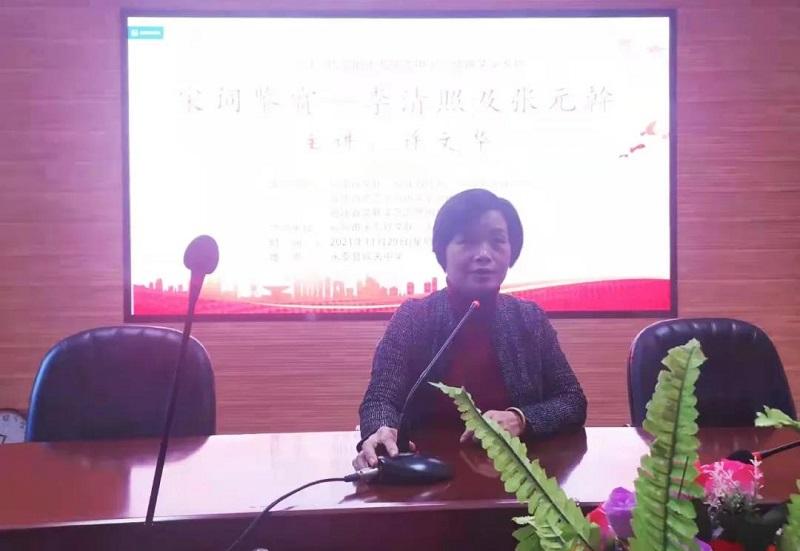In order to publicize and implement the spirit of the Sixth Plenary Session of the Nineteenth Central Committee of the Communist Party of China, practice the literary and artistic work orientation of "going deep into the grassroots and taking root in the people", and improve the writing level of middle school students' literary lovers, the "100 Lectures of 100 Writers Forever Following the Party", one of the series of activities for the 930th anniversary of Zhang Yuangan's birth, was recently held in Chengguan Middle School, Yongtai County.

Xu Wenhua, member of the Plenary Committee of fujian Writers Association, director of Fuzhou Writers Association, honorary chairman of Yongtai County Writers Association, and senior teacher of Chengguan Middle School in Yongtai County, gave a literary lecture on "Appreciation of Song Words - Li Qingzhao and Zhang Yuangan".
The so-called beautiful paintings, as an important literary carrier of classical Chinese culture - ancient poetry, not only have the beauty of rhythm, but also allow people to understand the sense of different artistic conceptions. Teacher Xu Wenhua talked about the development and characteristics of words, introduced the origin, formation and development of words, as well as the aesthetic development and changes of Tang and Song dynasties. Then, it focused on the poetic characteristics of Zhang Yuangan, a famous patriotic lyricist of the Southern Song Dynasty, and Li Qingzhao, a representative figure of the Song Dynasty.
Teacher Xu introduced that Zhang Yuangan is a historical and cultural celebrity of Yongtai, a patriotic lyricist who is famous throughout the country in the Southern Song Dynasty, and has a place in the history of Chinese literature and Chinese history. His poetry creation, inheriting Du Fu's realistic patriotic themes and Su Shihao's style of words, and lower Qilu You and Xin Abandoned Disease, created a precedent for the patriotic poetry style of the Haofang school in the early Southern Song Dynasty, and played an important role in the field of Song Dynasty Haofang. His words and the poems of Huang Ren, a famous poet of the Yongtai Qing Dynasty, are collectively known as "Yongtai Poetry Double Bi", which has become one of the symbols of Yongtai's thick classical culture. Today, when we study Zhang Yuan's words, we have both literary and historical meanings. Then, together with the students, they studied and tasted Zhang Yuangan's four poems, "ManJiang Hong, Zi Yu Zhang Obstructing the Wind, Wu Chengshan Zuo", "Shizhou Slow, Ji Youqiu Wu Xingzhou Zhongzuo", "He Groom Send li Boji Cheng Xiang", and "He Groom Send Hu Bangheng to Xinzhou". Tasting these four poems, I not only understood his artistic techniques, but also improved the image of the lyricist Zhang Yuangan from the profound thoughts of the lyrics, and learned his great feelings of patriotism and love for the country.
Talking about Li Qingzhao, teacher Xu Wenhua said that Li Qingzhao is a famous female writer in the history of Chinese literature, she is studious and talented, she can write poetry, and her lyrics are especially in the Song Dynasty, known as the representative figure of the Song Wanyi School. But her works are not only gentle works, but also bold words. His book "On Words" put forward the "lexical thinking of the Other Trees". "Yi'an body" is its original and distinctive genre, in terms of language style, Li Qingzhao, in addition to being good at using simple words to express fresh thoughts, is also good at the use of double voices and overlapping rhymes, so that the language of words is rich in rhythmic beauty. Then Teacher Xu led the students to taste and read Li Qingzhao's lyrics "Like a Dream Order", "Drunken Flower Yin", "Slow Voice", "Yong Yu Le", and "Fisherman's Pride".
The long river of history, slowly flowing east, in the meantime, the big waves and sand, the years change, how much prosperity is forgotten. However, as a miracle in the history of classical Chinese literature, the Song Ci, has been passed down through the ages and shines like the sun and the moon. By listening to this lecture, the students improved their appreciation of ancient poetry and gained a better understanding of traditional classical literature.